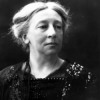Lady Gregory

Lady Gregory
Isabella Augusta, Lady Gregorywas an Irish dramatist, folklorist and theatre manager. With William Butler Yeats and Edward Martyn, she co-founded the Irish Literary Theatre and the Abbey Theatre, and wrote numerous short works for both companies. Lady Gregory produced a number of books of retellings of stories taken from Irish mythology. Born into a class that identified closely with British rule, her conversion to cultural nationalism, as evidenced by her writings, was emblematic of many of the political struggles to...
NationalityIrish
ProfessionDramatist
Date of Birth15 March 1852
CountryIreland
It was at Inver Slane, to the north of Leinster, the sons of Gaedhal of the Shining Armour, the Very Gentle, that were called afterwards the Sons of the Gael, made their first attempt to land in Ireland to avenge Ith, one of their race that had come there one time and had met with his death.
There is many a man without learning will get the better of a college-bred man, and will have better words, too.
Every trick is an old one, but with a change of players, a change of dress, it comes out as new as before.
It is not always them that has the most that makes the most show.
It was among farmers and potato diggers and old men in workhouses and beggars at my own door that I found what was beyond these and yet farther beyond that drawingroom poet of my childhood in the expression of love, and grief, and the pain of parting, that are the disclosure of the individual soul.
It is what the poets of Ireland used to be saying, that every brave man, good at fighting, and every man that could do great deeds and not be making much talk about them, was of the Sons of the Gael; and that every skilled man that had music and that did enchantments secretly, was of the Tuatha de Danaan.
Queen Victoria was loyal and true to the Pope; that is what I was told, and so is Edward the Seventh loyal and true, but he has got something contrary in his body.
The first play I wrote was called 'Twenty-five.' It was played by our company in Dublin and London, and was adapted and translated into Irish and played in America.
The time the moon is going back, the blood that is in a person does be weakening, but when the moon is strong, the blood that moves strong in the same way. And it to be at the full, it drags the wits along with it, the same as it drags the tide.
And my desire,' he said, 'is a desire that is as long as a year; but it is love given to an echo, the spending of grief on a wave, a lonely fight with a shadow, that is what my love and my desire have been to me.
If the past year were offered me again, And choice of good and ill before me set Would I accept the pleasure with the pain Or dare to wish that we had never met?
Everything that is bad, the falling sickness - God save the mark - or the like, should be at its worst at the full moon. I suppose because it is the leader of the stars.
There's more learning than is taught in books.
In writing a little tragedy, 'The Gaol Gate,' I made the scenario in three lines, 'He is an informer; he is dead; he is hanged.' I wrote that play very quickly.